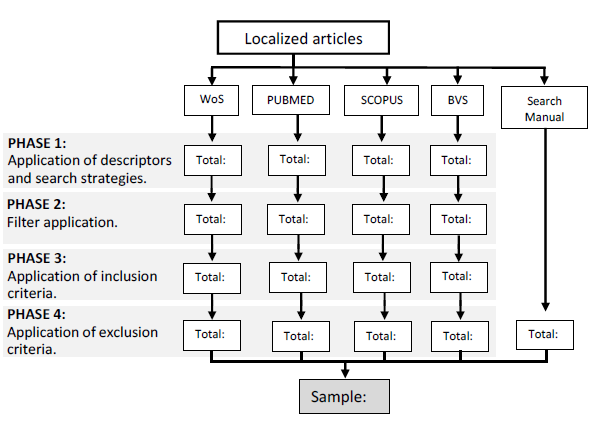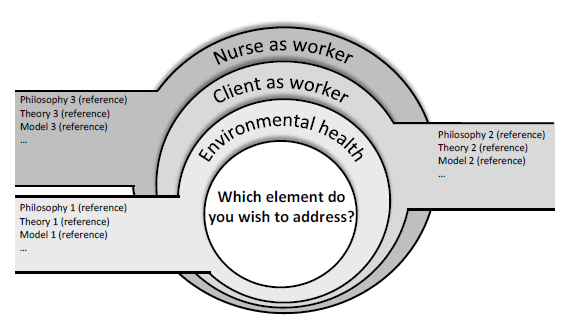Life and health sciences
Philosophies, theories, and models used in occupational nursing: a review protocol
Filosofias, teorias e modelos utilizados na enfermagem do trabalho: um protocolo de revisão
Filosofías, teorías y modelos usados en la enfermería del trabajo: un protocolo de revisión
1 Universidad de Antofagasta, Departamento de Antofagasta, Antofagasta, Chile
2Universidad Andrés Bello, Santiago, Chile
Abstract
Objective:
Identify nursing philosophies, theories and conceptual models applied to occupational health nursing.
Method:
Integrative review protocol, according to the six-stage proposal of Toronto and Remington in the year 2020, the WoS, PUBMED, SCOPUS and BVS databases will be consulted; after applying the filters, the summaries of each article will be read, those that meet the previously defined inclusion and exclusion criteria will be extensively reviewed; The quality control of the results will be through the evaluation scale of articles with heterogeneous methodologies for integrative reviews.
Results:
The results will be presented in narrative format, grouping the identified philosophies, theories, and conceptual frameworks into three categories: i. nurse as worker; ii. client as worker; iii. environmental health.
Conclusion:
It is expected that the review provides guidance on the use of theoretical frameworks to address health situations in occupational nursing, paying tribute to the excellent quality that nursing must have in the management of occupational health care.
Keywords: models nursing; nursing research; nursing theory; occupational health nursing; philosophy nursing
Resumo
Objetivo:
Identificar filosofias, teorias e modelos de enfermagem aplicados à enfermagem do trabalho.
Método:
Protocolo de revisão integrativa, de acordo com a proposta de seis fases de Toronto e Remington em 2020, as bases de dados WoS, PUBMED, SCOPUS e BVS serão consultadas; após a aplicação dos filtros, serão lidos os resumos de cada artigo, os que cumprem os critérios de inclusão e exclusão previamente definidos serão revistos na íntegra; o controlo de qualidade dos resultados será efetuado através da escala de avaliação dos artigos com metodologias heterogéneas para revisões integrativas.
Resultados:
Os resultados serão apresentados em formato narrativo, agrupando as filosofias, teorias e quadros conceptuais identificados em três categorias; i. enfermeiro como trabalhador; ii. cliente como trabalhador; iii. saúde ambiental.
Conclusão:
Espera-se que a revisão forneça orientações sobre o uso de referenciais teóricos para abordar situações de saúde na enfermagem do trabalho, homenageando a excelente qualidade que a enfermagem deve ter na gestão do cuidado em saúde do trabalhador.
Palavras-chave: enfermagem do trabalho; filosofía em enfermagem; modelos de enfermagem; pesquisa em enfermagem; teoría de enfermagem
Resumen
Objetivo:
Identificar filosofías, teorías y modelos conceptuales de enfermería aplicados en la enfermería del trabajo.
Método:
Protocolo de revisión integrativa, según propuesta de seis etapas de Toronto y Remington en el año 2020, se consultarán las bases de datos WoS, PUBMED, SCOPUS y BVS; tras la aplicación de los filtros, se leerán los resúmenes de cada artículo, aquellos que cumplan con los criterios de inclusión y exclusión previamente definidos, serán revisados en extenso; el control de calidad de los resultados será a través de la escala de evaluación de artículos con metodologías heterogéneas para revisiones integrativas.
Resultados:
Los resultados se presentarán en formato narrativo, agrupando a las filosofías, teorías y marcos conceptuales identificados en tres categorías: i. enfermera como trabajador; ii. cliente como trabajador; iii. salud ambiental.
Conclusión:
Se espera que la revisión proporcione orientación sobre el uso de marcos teóricos para el abordaje de situaciones de salud en la enfermería del trabajo, tributando a la excelsa calidad que enfermería ha de tener en la gestión de cuidados en la salud laboral.
Palabras clave: enfermería del trabajo; filosofía en enfermería; investigación en enfermería; modelos de enfermería; teoría de enfermería
Introduction
Nursing as a discipline, profession, and science of care, has presented a copious development in a relatively short time, thanks to the theoretical framework that has been built, because over the years it has become more corpulent, providing a powerful framework that guides the role and functions of nursing.
The first work considered as a theoretical source of nursing is attributed to Florence Nightingale, despite the fact that her objective was never to create a theoretical framework, her scientific contributions undoubtedly mean even today an orientation for the practice of nursing and related sciences, the origin of her theory is attributed to the publication of her book "Notes on nursing: What it is and what it is not" in 1859 (Nightingale, 1860), since in it a wealth of knowledge associated with sanitary conditions is made known, which is why it is called "environmental theory".
It is pertinent to point out that some authors do not recognize Nightingale as the first theorist, however, she is considered the starting point for the development of the corpulent theoretical framework that the nursing profession enjoys today (Naranjo, 2020).
A theoretical framework is the path that guides practice, predicts phenomena, and thus guides the work, each theory provides a different view on the concepts of the nursing metaparadigm, it should be noted that no theory is better than another, but rather there are theories that fit better to some situations than others, there is the importance of knowing them (Fawcett, 2017).
Occupational nursing has an ancient origin (Topcu & Ardahan, 2019), and its work has been highlighted with the passage of time, where nursing, through its monopoly of competence: "care management", has a predominant role in addressing the health of workers (Valencia-Contrera, 2022a). Under the above premise, the present review protocol is developed, which responds to the objective of identify philosophies, theories, and conceptual models of nursing applied in occupational nursing, to facilitate and guide the use of theoretical frameworks in occupational nursing practice and research, as well as to distinguish developed areas and knowledge gaps.
1. Methods
There is currently a wide variety of types of secondary research, of which integrative reviews stand out, as they have been described as providing a comprehensive view of a topic, whose distinctive feature is the use of various data sources (Kutcher & LeBaron, 2022).
This review protocol is structured in six stages (Toronto & Remington, 2020): 1. Formulation of broad purpose and/or review question(s); 2. Systematic search and selection of literature using predetermined criteria; 3. Appraisal of quality of selected studies; 4. Analysis and synthesis of literature; 5. Discussion on new
knowledge; 6. Dissemination of findings.
To fulfill the first stage, the question was formulated: What nursing philosophies, theories or conceptual frameworks guide the work in occupational health? In the second stage, the different searches were organized in Spanish, English and Portuguese, using descriptors validated in the DeCS thesaurus and the Booleans "AND" and "OR", the search is shown in Table 1.
Table 1 Descriptors and Booleans to be used in searches

The databases used will be Web of Science (WoS), PUBMED (United States National Library of Medicine), SCOPUS, and Biblioteca Virtual en Salud (BVS). The search strategies and filters to be used in each database are shown in Table 2.
Table 2 Search strategies and filters applied

The inclusion criteria used will be articles in the three languages mentioned, published in the period 1966 to the review date, and that use a philosophy, theory, or conceptual model of nursing in the context of occupational health; exclusion criteria correspond to letters to the editor and editorials. The review flowchart is shown in Figure 1.
Once the tentative sample is defined, the third stage "evaluation of the quality of selected studies" takes place, where the way in which the quality of the sample will be evaluated should be made transparent, for example through the scale of evaluation of articles with heterogeneous methodologies for integrative reviews (Valencia-Contrera & Orellana-Yañez, 2022), whose application has presented indications that could improve the quality of the sample in integrative reviews (Valencia-Contrera, 2022b).
Subsequently, it is recommended that documents that have successfully passed the quality filter be stored in public repositories and their generated DOI should be referenced, for example through Mendeley Data.
2. Results
In the fourth stage of the review, "literature analysis and synthesis", the results will be presented in narrative format, grouping the philosophies, theories and conceptual frameworks identified in the following categories: "nurse as worker"; "client as worker"; "environmental health". These categories were arbitrarily proposed by the present author and should be refined according to the results identified. Finally, the titles of the identified theoretical frameworks and their respective references are shown in Figure 2, as a proposal that allows the results to be organized and classified graphically, making access to them more practical.
Conclusion
The results identified will make it possible to respond to the stated objective, identifying theoretical frameworks that will facilitate their use through the presentation of these in an organized manner, so that each professional in nursing and related sciences can select the most suitable theoretical framework for the approach to health situations in occupational nursing, contributing to the excellent quality that nursing must have in the management of occupational health care. On the other hand, it will be possible to distinguish developed areas and knowledge gaps in occupational nursing, allowing to stimulate the development of those less addressed.
References
Fawcett, J. (2017). Applying conceptual models of nursing, quality improvement, research, and practice. 1st ed. New York: Springer Publishing Company. https://usermanual.wiki/m/68d3e394a142ad86a78f0b6f7de3122b6711764437fd2cfe57f8f452a435fe2c.pdf
[ Links ]
Kutcher, A. M., & LeBaron, V. T. (2022). A simple guide for completing an integrative review using an example article.Journal of Professional Nursing: Official Journal of the American Association of Colleges of Nursing,40, 13-19. https://doi.org/10.1016/j.profnurs.2022.02.004
[ Links ]
Naranjo-Hernández, Y. (2020). Impronta de la obra de Florence Nightingale en la formación de recursos humanos de Enfermería. Revista Información Científica, 99(6), 609-619. http://www.revinfcientifica.sld.cu/index.php/ric/article/view/3100
[ Links ]
Nightingale, F. (1860). Notes on Nursing: What it Is, and what it is Not. New York: D. Appleton and Company.
[ Links ]
Topcu, S., & Ardahan, M. (2019). Occupational health nursing and pioneer leaders from past to present. International Journal of Caring Sciences, 12(3), 1931-1935. http://www.internationaljournalofcaringsciences.org/docs/68_topku_review_12_3.pdf
[ Links ]
Toronto, C.E., & Remington, R. (2020). A step-by-step guide to conducting an integrative review. Cham, Switzerland: Springer International.
[ Links ]
Valencia-Contrera, M. A. (2022a). Necesidad de enfermeros especialistas en salud ocupacional. ENE, Revista de Enfermeria, 16(1), 1-3. http://ene-enfermeria.org/ojs/index.php/ENE/article/view/1340
[ Links ]
Valencia Contrera, M.A. (2022b). Escala de evaluación de artículos con metodologías heterogéneas para revisiones integrativas. Revista Cuidarte, 13(2), e2744. https://doi.org/10.15649/cuidarte.2744
[ Links ]
Valencia-Contrera, M. A., & Orellana-Yañez, A. E (2022). Fenómeno techo de cristal en enfermería: revisión integrativa. Revista Cuidarte , 13(1), e2261. http://dx.doi.org/10.15649/cuidarte.2261
[ Links ]



















